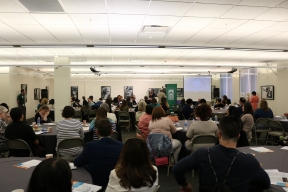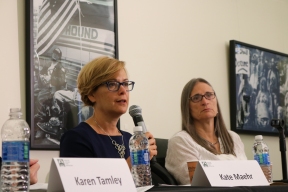
A study released Thursday by the Greater Chicago Food Depository shows low-income adults with disabilities in Cook County are at a significantly increased risk of hunger compared to similar individuals without disabilities. The report finds 31 percent of all households with a working-age adult with a disability are food insecure, compared to eight percent of households with a working-age adult with no disabilities. Titled Food Insecurity Among Low-Income Adults with Disabilities in Cook County, Illinois: Realities and Remedies, the study was executed with assistance from Access Living, Progress Center for Independent Living, Anixter Center and other organizations. It was compiled using U.S. Census Bureau data, focus groups and surveys. “Whether disabled or non-disabled, no one should struggle with hunger,” said Kate Maehr, Food Depository executive director and CEO. “Based on physical and social barriers, cuts to social services, and health needs, people with disabilities are more at risk of hunger,” said Marca Bristo, President & CEO of Access Living. “This report promises to be a critical tool to identify and eliminate barriers that contribute to food insecurity for people with disabilities.” The report was supported by a grant from The Chicago Community Trust. The report reveals many of the food access barriers low-income adults with disabilities face, including:

- Food insecurity among adults with disabilities occurs in every Cook County community. Areas on the west side of Chicago exhibit the highest need for additional food assistance resources, yet many neighborhoods across Chicago and the suburbs show high proportions of people with disabilities living in low-income households and inadequate coverage in terms of food assistance programs.
- Supplemental Nutrition Assistance Program (SNAP) benefits are critically important to people with disabilities. This report finds SNAP provides an estimated 80 percent of the food assistance reaching adults with disabilities in Cook County.
- The need for a state budget has never been clearer. Many organizations providing necessary services to people with disabilities have been forced to lay off staff and cut back on services due to the State of Illinois’ backlog of unpaid bills.

To read the full report, visit chicagosfoodbank.org. For more information, visit chicagosfoodbank.org or call 773-247-FOOD.








